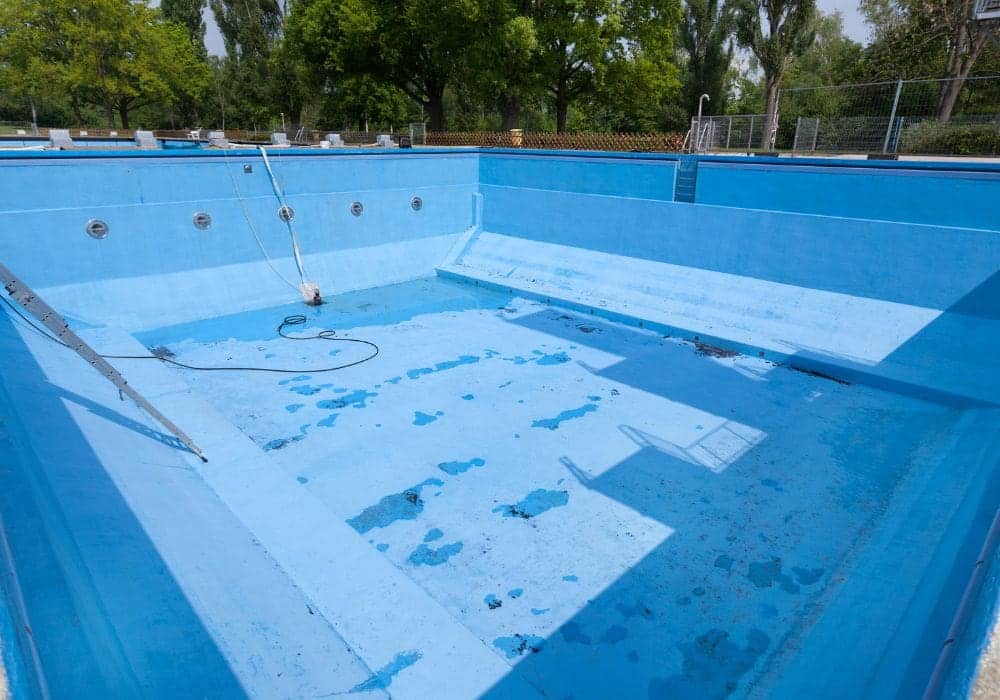
Keeping your swimming pool clean and clear isn’t just about aesthetics—it’s also about pool maintenance. A good swimming pool tile cleaner helps remove stains, algae, and calcium deposits. Yet, using the wrong methods can lead to costly damage.
At RMD Pool Service, we’ve helped many pool owners avoid these mistakes and want to help you, too. Here are five common errors to steer clear of when cleaning your pool tiles.
1. Using the Wrong Swimming Pool Tile Cleaner
Not all tile cleaners are safe for pool tile cleaning, and can have serious consequences. Some contain harsh chemicals that can damage glass tile, stone, or ceramic surfaces. For instance, if you’re dealing with stubborn calcium deposits, a cleaning solution like diluted muriatic acid can work—but only when used properly.
What to Do Instead:
- Choose a swimming pool tile cleaner made for pool tile cleaning.
- Test the cleaner on a small area before applying it to all pool tiles.
- Consult a pool service professional if you’re unsure.
2. Scrubbing Too Hard or Using the Wrong Tools
Using metal brushes or rough scouring pads can scratch your pool tiles, making them prone to more buildup.
What to Do Instead:
- Use a dustless blasting technique for deep stains.
- Opt for a soft-bristle brush or a pumice stone.
- Consider hiring professional pool tile cleaning services for stubborn stains.
3. Ignoring Pool Water Chemistry
If your pH levels are off, or your pool pump isn’t working efficiently, you’ll struggle with cloudy water and tile buildup. Unbalanced water leads to excessive mineral deposits, making it harder to keep your pool cleaned.
What to Do Instead:
- Regularly test and adjust ph levels.
- Schedule weekly pool maintenance to keep your swimming pool in top shape.
- Ensure your pool filtering system is functioning properly.
Dive Deeper: 7 Astonishing Ways to Achieve Stunning Dark Blue Pool Water
4. Neglecting Regular Pool Maintenance
Regular pool maintenance is crucial. Waiting too long between cleanings allows dirt, algae, and calcium deposit to harden. This makes them harder to remove, potentially causing damage to your pool tiles.
What to Do Instead:
- Set up a weekly pool regular cleaning schedule.
- Use a swimming pool tile cleaner regularly.
- If the buildup becomes thick, consider a drain & cleaning service.
Know More Here: An Essential Guide for Pool Maintenance for Beginners: 7 Easy and Stress-Free Tips
5. Skipping Professional Cleaning When Needed
While DIY cleaning works for light maintenance, sometimes professional pool service is the best way to go. Experts can get your pool floor and pool tiles spotless and maintain their condition.
What to Do Instead:
- For persistent stains, call a stain chemical treatment specialist.
- A one-time pool cleaning service can refresh your swimming pool.
- For ongoing care, opt for pool maintenance services including pool filter cleaning service.
Also Read: 10 Important Considerations When Hiring Professional Pool Cleaners You Need To Know!
Final Thoughts
Staying away from these common mistakes can help extend the life of your pool tiles and keep your pool clean and inviting. Whether you need a deep clean or ongoing pool maintenance, RMD Pool Service is here to help. We proudly serve Murphy, Wylie, Parker, Frisco, Richardson, and surrounding areas.
FAQs About Swimming Pool Tile Cleaner & Maintenance
1. How often should I use a swimming pool tile cleaner?
Clean your pool tiles at least once a week to prevent calcium deposits, algae, and stains from building up. If your pool sees heavy use, consider cleaning twice a week.
2. What’s the safest way to remove calcium buildup from pool tiles?
Use a pumice stone or a swimming pool tile cleaner with descaling properties for light buildup. A stain chemical treatment or bead blasting is the safest and most effective solution for tough stains.
3. Can I use vinegar or baking soda to clean my pool tiles?
Vinegar can help dissolve mild stains and hard water deposits, but it’s not strong enough for heavy calcium buildup. Baking soda works well for general cleaning but won’t remove deep stains.
4. What’s the best way to clean grout between pool tiles?
Use a soft brush and a mild tile cleaner to scrub the grout gently. For deeper stains, a professional pool tile cleaning service may be needed to restore the grout without damage.
5. Why do my pool tiles turn white or cloudy?
Hard water deposits, high pH levels, or calcium scaling usually cause white or cloudy stains. Keeping your pool chemistry balanced and using a pool filter cleaning service can help prevent this issue.
6. What tools should I avoid when cleaning pool tiles?
Avoid metal brushes, wire scrubbers, and rough scouring pads. They can scratch and damage glass tile, stone, and ceramic surfaces. Use a soft-bristle brush or a pumice stone instead.
7. How do I prevent algae from growing on my pool tiles?
Algae thrive in stagnant water and poor circulation. Regular pool maintenance, balanced pool chemicals, and a well-functioning pool pump will keep algae at bay.
8. What is bead blasting, and is it safe for pool tiles?
Bead blasting is a professional cleaning method that removes calcium deposits and tough stains without damaging the tiles. It’s one of the best options for restoring pool tile surfaces.
9. Can unbalanced pool water ruin my pool tiles?
Yes. pH levels that are too high or too low can lead to calcium scaling and stains. It can even cause erosion of your pool tile grout. Regular testing and weekly pool maintenance can dodge these problems.
10. When should I call a professional for pool tile maintenance?
If your tiles have heavy calcium buildup, stubborn stains, or discolored grout, it’s time for a professional swimming pool tile cleaner. A drain & cleaning service can also help if your pool has been neglected for a long time.
Let RMD Pool Service take care of your pool filtering, pool equipment, and other swimming pool services. Keeping up with maintaining your pool has never been easier! Contact us for a free consultation.
Also Read:
Bug Cleaner for Pool: Top 10 Guaranteed Strategy to Try for Crystal Clear Water
